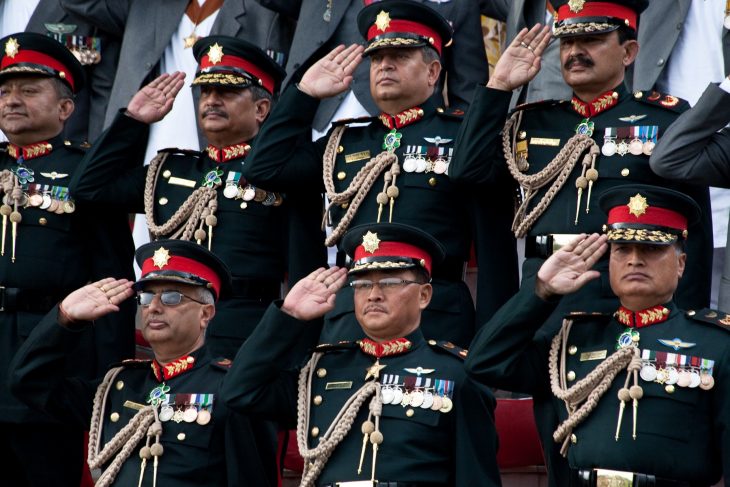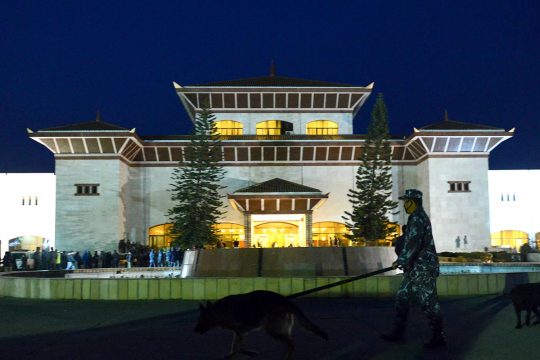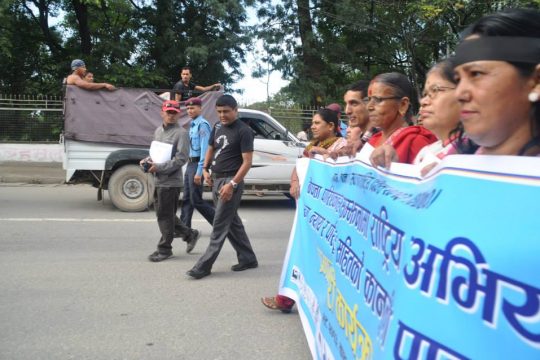The first women chief justice of the Supreme Court, Shushila Karki, was an independent and strong chief justice who was against the political influence or unwanted interference in judiciary. She has challenged the powerholders through judicial process openly such as declared chief of Commission on Investigation of Abuse of Authority, Nepal anti-corruption body, Lokman Singh Karki an incompetent in her verdict, who was appointed by then government in a ‘political consensus’.
On 30 April, Justice Karki made a verdict to prosecute three former Chiefs of Nepal police on corruption charges. Justice Karki also issued a warrant arrest to the former Maoist parliamentarian Balkrishna Dhungel after government’s protection. The ruling parties: Nepali Congress and the Maoist Centre felt threat and decided to go against the judicial intervention on the role of executives. The politicians and the ruling parties alleged Justice Karki was biased to choose of judges in the political and corruption cases; she was guided by anti-government motives in high profile cases and advancing anti-state judiciary role. Specially the president of Nepali Congress, Sher Bahadur Deuba, the largest party in the house and waiting Prime-minister in the political negotiation, was the architect of the impeachment motion along with the coalition partner – the Maoist centre, their main disappointment was with the recent Supreme Court verdict of the justice Karki-led bench that rejected the government’s decision to appoint chief of Nepal police. Government was unhappy against the court ruling for judiciary interference on the role of executives that resulted an impeachment motion which has further deepened the crisis in between the executives and the judiciary. The government repeated the similar charges and argued that the impeachment is constitutional, in a letter sent to the United Nations. It might have long-term impacts in justice delivery process in Nepal. 30 April 2017 - lawmakers from Nepali Congress and Maoist parties have registered an impeachment in the parliament against Supreme Court chief justice Shushila Karki and suspended her from her position.
Political protection
Controversy over the judiciary began at the very beginning of the peace process. Political leaders were not happy with the role of court, and have failed to reconcile their process and understanding. The tensions between the executive, the judiciary and parliament are now at the forefront of a deepening crisis. The ruling parties and opposition were divided on the various cases based on an entirely political way of thinking, notably linked to the reintegration of Maoist combatants, the promotion of senior army and police officers, and implementing National Human Rights Commission (NHRC) recommendations to act on conflict era crimes. The overall role of the major parties – Nepali Congress, Unified Marxist-Leninist and the Maoist Centre – has always been one of political protection for their mutual benefit.
Hundreds of cases related to conflict-era crimes have been withdrawn from the court, protecting officers involved in war crimes and demonstrating a lack of political will to confront perpetrators, and a denial of justice. A few examples of major cases include: the promotion and protection of Raju Basnet, the alleged perpetrator of the Bhairabnath disappearances, and the torture and killings that took place between September and December 2004 termed as ‘Kathmandu Killing Field’ in the Human Rights Watch Report; Niranjan Basnet – an alleged perpetrator of infamous 15-year-old Maina Sunuwar’s kidnapping, rape and murder that took place in 2003 (). Both Basnets continue to serve in the Nepal army. Former Chief of Nepal Police Kuber Sing Rana, then regional chief of police Chuda Bahadur Shrestha, then chief district officer Rewati Raj Kafle and Major Anup Adhikari, alleged perpetrators of the Dhanusa 5 disappearances and killings of five students in 2003, was promoted and protected by the then government, senior police officer Pitamber Adhikari, who was directly involved in the detention, torture and disappearance of Tej Bahadur Bhandari in 2001 ( Tej Bahadur Bhandari is the the father of our correspondent in Nepal), and current Deputy Inspector General (DIG) Nawaraj Silwal was alleged to have detained, tortured and disappeared then Nepal Bar Association president of Gorkha district advocate Rajendra Dhakal in 1999. Silwal remains politically active, and was competing to be appointed Chief of Nepal Police. Hundreds of accused and alleged perpetrators still serve and benefit from the authorities without trial. The failure of the Nepali authorities to bring to justice is a big shame. To date, not a single perpetrator suspected of criminal responsibility for serious human rights violations or crimes under international law committed during the war has been brought to justice in a criminal court.
Conflict survivors
To date the courts, political leaders, civil society and media have been silent against the alleged perpetrators and raised little voice against such criminal gangsters active in Nepali politics and security forces, who have turned the Nepali system into a criminal enterprise. The actors are divided and raise the issues based on their interest, which is a serious obstacle to the struggle for justice which has been a big challenge for the social justice movement and truth seeking process in Nepal.
Due to the highly politicized process in the aftermath of conflict, a decade has passed as thousands of conflict survivors continue to wait for truth, justice and reparations. Conflict victims and survivors have been re-victimsed by the politicization and instrumentalisation of interest groups who often fight for their own interests, not to support victims’ struggle for justice.
In 2013 then supreme court chief justice Khilraj Regmi was accepted and appointed as Chief of the Council of Ministers and acted as the chief executive of the government and chief of the judiciary. He introduced a truth and reconciliation commission (TRC) ordinance (March 2013) to grant amnesty for ‘political’ crimes and damaged the credibility of Nepal’s independent judiciary, as the ordinance was nullified by the Supreme Court Verdict of 2 January 2014.
Constitutional crisis
The politicization of the court has not only damaged the judiciary but also affected the appointment process judges in the apex court and the high court in recent years, and may affect the next decade for Nepal in terms of the rule of law. This is the new beginning of the rule of law debate in Nepal, that the general public and advocates have been experiencing the consequences on various cases from conflict time, including habeas-corpus writs concerning the many torture, rape, extra judicial killings and disappearances cases against the powerful who controls the agenda.
The four former chief justices of the Supreme Court, including NHRC Chair Anupraj Sharma, on 1 May 2017 issued a joint press statement that said: “the impeachment is biased and has a vested political interest in that the impeachment motion has been registered by compromising the judicial independence and with the intent of weakening the judiciary by triggering controversies”.
On 5th May, Supreme Court justice Cholendra Shamsher JB Rana issued an interim order against the impeachment and suspension of chief justice. The ruling parties charged the chief justice that the court interfered with the executive’s decision and created tension, showing their anger to weaken the judicial system, where the judicial activism has been politically entertained by the elites for few, not for the majority peoples and the marginalised.
On 7th May the Speaker of the House, Onsari Gharti, accused the judiciary of influencing the jurisdiction of the parliament by issuing an interim stay order against the discussion of impeachment motion filed against Chief Justice. The Speaker said “every state organ should abide by their jurisdiction. The constitution has clearly stated the role of each state organ, the tussle between top state bodies would hamper the institutionalisation of democracy”.
After the signing of the Comprehensive Peace Agreement (CPA) in 2006 , the major political forces failed to address the legacy of conflict, and transform the nation into a genuine democratic state. Nepal still needs a democratization process that has been kidnapped by certain ruling class elites and the authorities need to end the excuses of their fault-lines.
In a context of constitutional crisis and political control in every sector victims have not only been isolated but seen their voices further marginalised. The existing Transitional Justice mechanisms do not seem to work for victims, but rather victimizes them through government controls and unwanted politicization. The current legal discourse and the ongoing local elections have fully undermined and disrupted these important Transitional Justice mechanisms in their investigations, as at the same time the limited spoilers within and outside the commissions intend to destroy the process and evidences. History offers a way to dealing with the past, to better understand the present and think about the future of sustainability.





